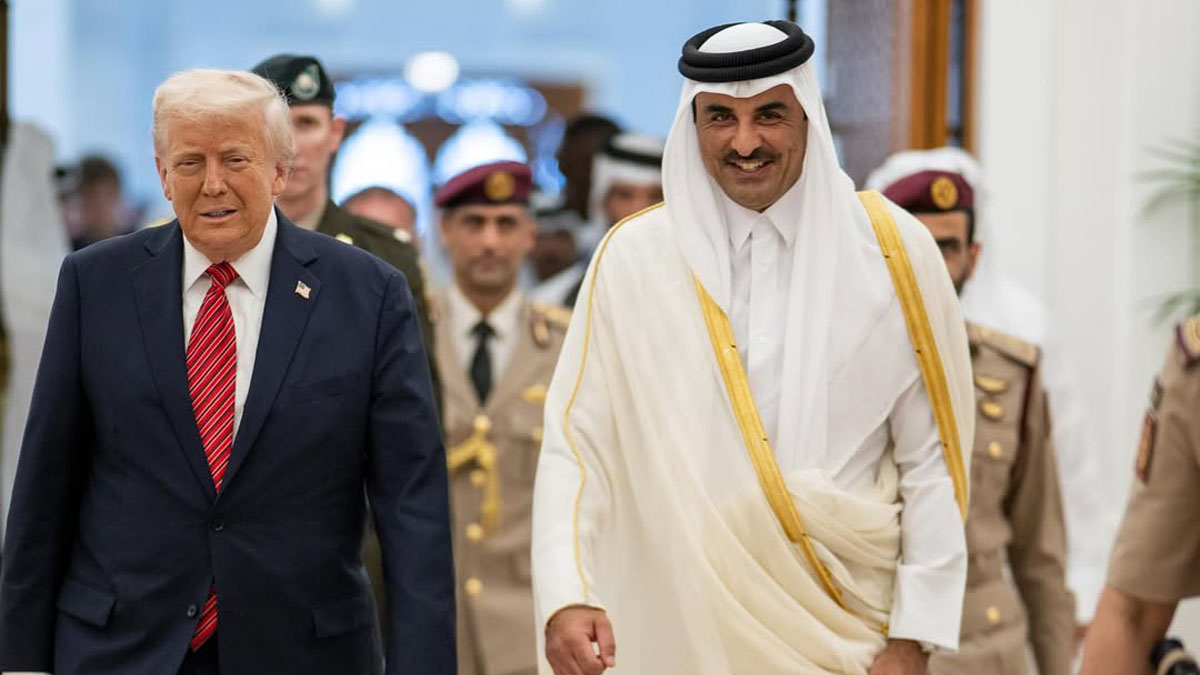Israel-Iran conflict: How did Trump, Qatar Emir convince Netanyahu and Tehran to ceasefire?

US President Donald Trump has announced what he described as a “complete and total ceasefire” between Iran and Israel, following a limited Iranian missile strike on an American military base in Qatar. The move comes after days of escalating hostilities, culminating in the American bombing of three Iranian nuclear sites, and raises cautious hopes of an end to what Trump dubbed “The 12 Day War”.
The Iranian strike, carried out last evening, targeted Al Udeid Air Base near Doha, the largest American military installation in the Middle East. According to US and Qatari officials, all but one were intercepted. One missile was allowed to land harmlessly. No casualties were reported, and Iran had informed both Qatar and the US in advance of the attack.
Qatar condemned the strike as a violation of its sovereignty, though its prime minister, Sheikh Mohammed bin Abdulrahman Al Thani, played a behind-the-scenes role in brokering a ceasefire. According to a Reuters report, Trump, after talking to Israeli Prime Minister Benjamin Netanyahu, informed the Emir of Qatar, Sheikh Tamim bin Hamad Al Thani, that Israel had agreed to a ceasefire if Iran halted its attacks. The Qatari prime minister then spoke directly with Iranian leaders and secured their agreement.
On his Truth Social platform, Trump congratulated Iran and Israel for having the “stamina, courage and intelligence” to end a conflict that “could have gone on for years and destroyed the entire Middle East”. Speaking to NBC later, he claimed the ceasefire was “unlimited” and would last “forever”. A senior White House official confirmed that Israel had agreed to the ceasefire, provided Iran refrained from further attacks.
However, Iran’s Foreign Minister Abbas Araghchi denied any formal agreement was in place, stating on social media that while Iran would stop its operations if Israel ceased attacks by 4am Tehran time, the final decision would be made later. The statement was posted just minutes after that deadline had passed.
Israeli airstrikes, which had pounded Tehran and other Iranian cities in the days leading up to the ceasefire, appeared to have stopped shortly before the 4am cut-off. But in the hours following Trump’s announcement, there were reports of renewed explosions in parts of Tehran, and Israeli forces issued evacuation warnings for certain areas of the Iranian capital. Israeli officials made no comment on the ceasefire and Netanyahu’s office did not respond to media enquiries.
On Iranian state television, anchors referred to a “Trump-claimed” ceasefire while reporting that Israeli forces had targeted cities including Urmia and Rasht. Iranian President Masoud Pezeshkian posted on X that while Iran was not seeking war, it would not tolerate aggression.
American defence officials described Iran’s missile attack on the base in Qatar as a “largely symbolic response” intended to demonstrate resolve while avoiding escalation. The strike echoed Iran’s restrained retaliation for the US assassination of General Qassem Suleimani in 2020, when ballistic missiles were fired at American bases in Iraq but caused no fatalities.
Most observers believe that Trump is seeking a de-escalation path after US strikes on Iranian nuclear facilities and Iran's restrained response against the American base in Qatar. Trump has claimed Total victory by announcing that Iran’s nuclear sites at Fordow, Natanz, and Isfahan were “completely obliterated.” However, Rafael Grossi, head of the International Atomic Energy Agency, stated that the IAEA has not yet been able to assess the damage, particularly at the deeply buried Fordow facility.
Despite the ambiguity, Trump advisers believe Iran will now pursue de-escalation. Tehran’s limited missile response, they argue, allows the regime to claim a proportionate reaction without inviting further Israeli or American retaliation.
With the region still tense and neither Israel nor Iran formally confirming the ceasefire, uncertainty remains. But Trump sought to frame the pause in fighting as a historic success. “This is a war that could have gone on for years, and destroyed the entire Middle East,” he posted. “But it didn’t, and never will.”
Middle East